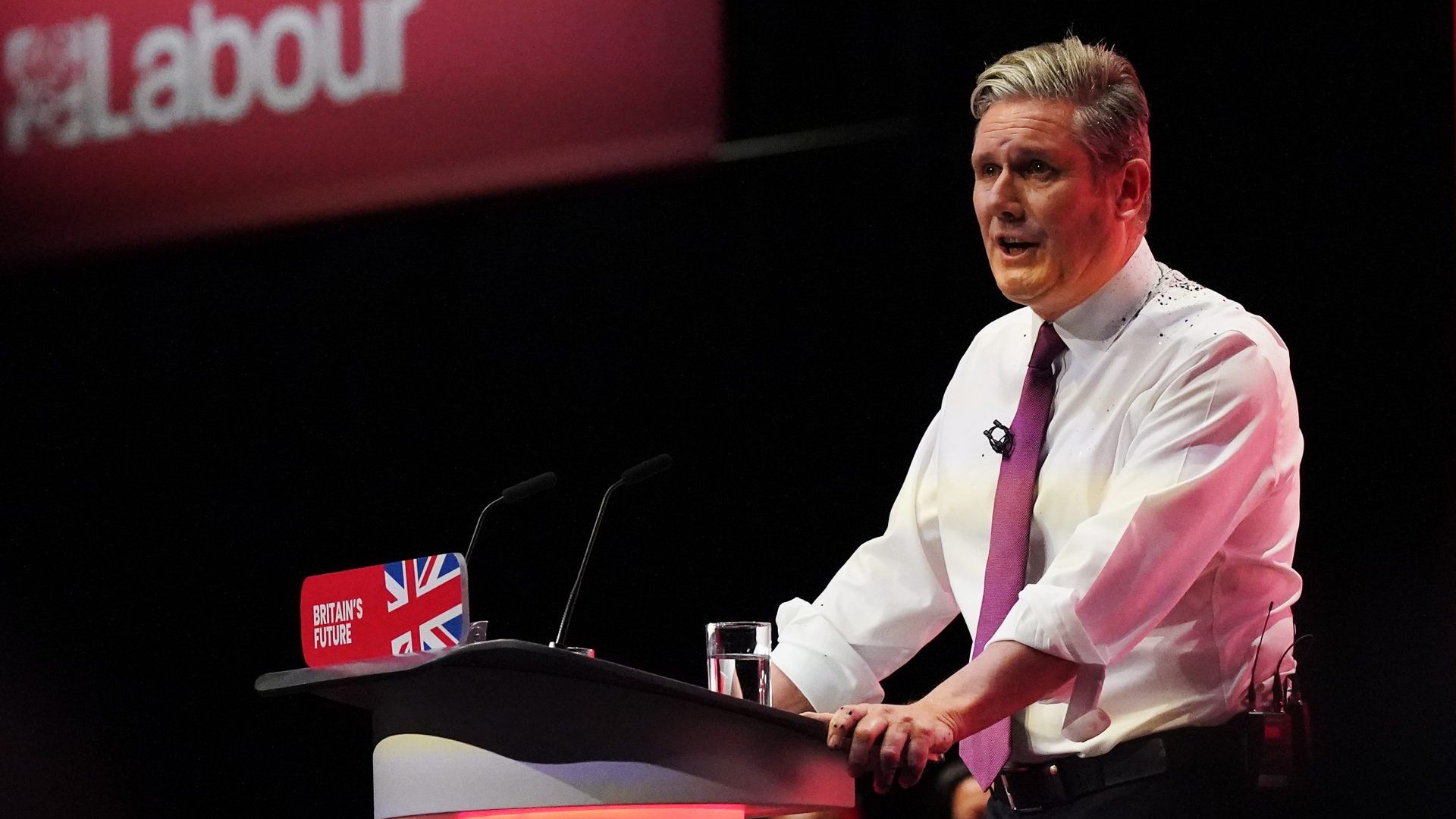Keir Starmer is often a rather low temperature public speaker, but in Liverpool he found a surprisingly passionate tone, in a speech that went hard on the ideals, but which was perhaps a little light on detail. But really, who goes to party conference for details?
Even though he can’t quite bring himself to admit it – not in public, at least – Starmer is a prime minister in waiting, with a clear 20-point lead in all of the opinion polls. That made Tuesday’s speech a straightforward exercise in political reassurance, and it contained two central messages for the electorate.
First, if you’re a wavering Tory voter who’s been unimpressed by the Johnson-Truss-Sunak era, then I’m your man. Second, the Labour Party isn’t mad any more. Corbyn and his supporters have all gone.
Except perhaps for one of them. No sooner had Starmer appeared, smiling and waving to the crowd, when a protester ran on stage and threw glitter all over his suit, before bellowing something about “people’s democracy” into the microphone. He was hauled off and there was a pause while Starmer took off his jacket and rolled up his sleeves. “Protest over power,” he ad libbed. “It’s why we changed our party.” It was a good line. The Corbynites would have hated it.
From that, it was straight into the Tory bashing. “I really do feel for any city that had to host that circus last week,” he said, referring to the Conservative Party conference in Manchester. Of Sunak, he remarked: “I’m beginning to see why Liz Truss won.”
This was a good gag that also drew attention to the difference between the Labour leader’s manner and that of the current PM. In the rounds of media interviews in Manchester, Sunak came across as peevish, narrow and defensive, not the qualities people instinctively look for in a leader. Starmer, by contrast, is beginning to sell himself as a politically much broader character, which is what you need when trying to win the centre ground.
And this speech was unmistakably a pitch to the centrist vote. Starmer conjured up a vision of a “Britain, built to last,” which can only be achieved by “worker and business, public and private,” all working together. “The barriers of dogma will not block our path,” he said, reminding the audience that “private enterprise is the way this country pays its way in the world.”
This is pure Third Way, Blairite stuff. Perhaps not original, but then it worked pretty well last time round, so why not give it a second go? And when he told the audience that “we say yes to sound money,” it was his first direct signal to erring Tories that Starmer is no leftist radical.
Those same wobbling Conservative voters will also notice that he delivered his speech in front of a huge Union Flag, that he told the crowd he wanted to make Labour “a party of service”, and that he promised to put “country first, party second”. Add all these things together and Starmer starts to look like a very conservative Labourite. That’s been quite an unfashionable political identity in recent years. The polls suggest it’s wildly popular.
He even turned briefly to Brexit – a rare occurrence for Starmer. Conservatives like Rishi Sunak, he said, “cannot see the country in front of them.” He continued, “they said that Brexit would only bring benefits to our businesses… they can’t see Britain – not your Britain.” It was a glancing reference, and it felt insubstantial.
Starmer went on to say that Labour “will fight the next election on economic growth.” Well, that sounds pretty good, but an excellent way to get growth would be to open Britain up to the largest trading block in the world – the EU – or better still, to rejoin it. Starmer still has much more to do on that issue.
As for the policy substance, he promised to overhaul the planning system and build 1.5 million new homes, creating what he called “the next generation of labour new towns”. A few Nimbys out in the home counties will have felt a chill on hearing that one. He also promised to overhaul non-dom tax status, which got a good cheer, and create a National Wealth Fund to stick money into factories, and ports and build new colleges. He also promised to create a new national renewable energy provider, and he wants to base it in Scotland. The crowd loved it.
This is the final conference season before the next election. In these circumstances, the most important thing is to come across as reassuring, in control, and to set out a broadly positive message. The Tories invited Nigel Farage to their conference, where he was pictured dancing with Priti Patel, and then spent most of the time desperately trying to deny that they were cancelling HS2 – before having to admit that they were indeed cancelling it. They were a complete mess.
Starmer, on the other hand, looks in control of himself, his message and his party. He looks, in other words, like a leader.











